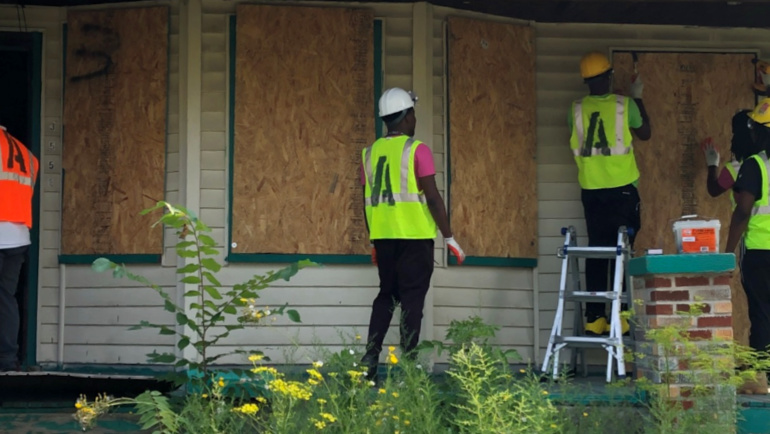
Opioids now kill more people each year than car accidents, according to the National Safety Council.
In response to this public health crisis — and aided by a $152,676 grant from the Corporation for National and Community Service — the AmeriCorps Community Training for Overdose Rescue (ACT) program will prepare community members in Southeast Michigan to take action during an overdose emergency to help save lives.
Launching in October 2019, the ACT program will recruit AmeriCorps service members from the community to teach others how to recognize an opioid overdose and how to respond if they discover an overdose emergency.
“We’re training neighborhood residents to be community first responders,” said Lyke Thompson, director of Wayne State University’s Center for Urban Studies, which oversees the AmeriCorps program. “People such as neighborhood patrollers, block club captains, business owners, librarians — anyone who might come in contact with someone after a drug overdose.”
The ACT program will equip trained participants with Overdose Rescue Kits containing Narcan — a life-saving nasal spray that quickly reverses opioid overdose. In the event of an opioid overdose, administering Narcan (also known as naloxone) immediately increases the likelihood of survival, minimizes other negative health effects and serves as a bridge to recovery from opioid addiction. Narcan is non-narcotic, has no potential for abuse or harm, and has no effect on a person who has not taken opioids.
Though ACT is a new program of the Strategies and Tools for Overdose Prevention (STOP) unit at the Center for Urban Studies, it builds on similar training efforts already underway. Over the past year, the STOP unit has delivered overdose rescue training to more than 400 community members in four high-need Detroit ZIP codes, supported by a consortium of funders under the Taking Action on Opioid and Prescription Drug Abuse in Michigan by Supporting Community Responses’ grant program.
Building on the achievements of the pilot project, the ACT program will expand training activities into other Southeast Michigan communities where alarmingly high numbers of overdoses are also occurring and expects to train 750 participants each year.
The Center for Urban Studies will also partner with the Detroit Health Department and other collaborators to deliver overdose rescue training to 1,000 Detroit residents per year, with the support of a grant from the federal Substance Abuse and Mental Health Services Administration.
“There are seat belts, tourniquets, defibrillators and Epi-pens — Narcan is another essential life-saving device,” said Lauren Meloche, who directs the ACT program. “Getting more Narcan into the hands of community members means that more people will have the opportunity to see another day.”
Partnering for urban safety
In addition to the ACT grant money, Wayne State’s AmeriCorps also received $706,486 for its Urban Safety Program (AMUS) initiative. AMUS outreach efforts involve surveying and then partnering with neighborhood nonprofits, churches and businesses. These community partners are asked to help sponsor block clubs, neighborhood watches, clean ups and board ups of open and dangerous buildings.
“The community organizing efforts of our members not only engages residents to form neighborhood block clubs and improve neighborhood guardianship, but has also contributed to a 34.1% average reduction in crime in targeted neighborhoods,” said Ramona Washington, director of the AMUS program. “That’s a savings of more than $378 million in reduced crime costs, and a return of $87.59 for each Corporation for National and Community Service dollar invested in our program.”
Thompson said both programs are heavily dependent on community organizations, and they are constantly looking for community and university partners to do this work. The university’s AmeriCorps initiatives are executed by approximately 80 members a year, 10% of whom are Wayne State students.
The recent grants even caught the attention of Michigan Gov. Gretchen Whitmer, who sent a letter on May 24 congratulating all the work AmeriCorps does in the community.
“Your selection to receive this grant shows your efforts and dedication in helping the people of our state,” Whitmer’s letter read. “Your work to promote well-being, further education and acquire job opportunities is essential to communities across the state. I am truly grateful for the work you do which reflects the values of compassion, generosity and selflessness.”
Thompson said the letter took him by surprise and he appreciates the governor’s support. He knows others on the team will, too.
“Governor Whitmer’s letter will help inspire all the people working on these projects,” Thompson said. “They give of their time and energy as AmeriCorps volunteers and this will help further instill pride in what they do.”